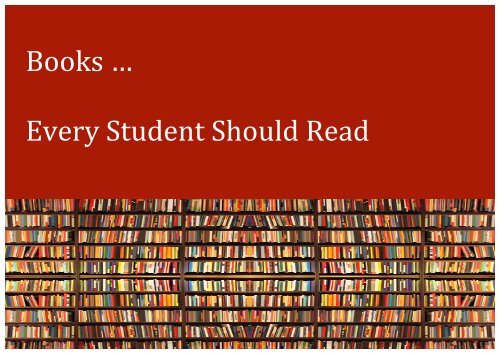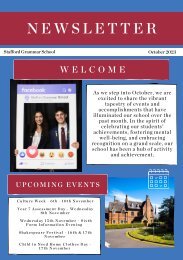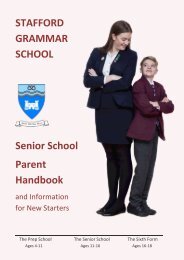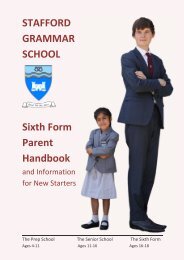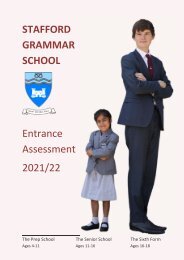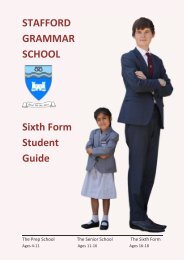You also want an ePaper? Increase the reach of your titles
YUMPU automatically turns print PDFs into web optimized ePapers that Google loves.
Books … <br />
Every Student Should Read
These suggestions are some books that you <br />
might like to read. It is certainly not an <br />
exhaustive <strong>list</strong> but we hope it will give you some <br />
inspiration. We hope it will make you think. The <br />
right book at the right moment can change the <br />
way we think about life, about ourselves and <br />
about the world. These books have been <br />
important in the lives of those who have <br />
recommended them. We hope that they will <br />
become important to you.
This is not a <strong>list</strong> for English students. <br />
This is a <strong>list</strong> for every student. Everyone <br />
should read. It is the most powerful thing <br />
you can do. <br />
‘The best moments in <strong>reading</strong> are when you come across something — a<br />
thought, a feeling, a way of looking at things — that you'd thought special,<br />
particular to you. And here it is, set down by someone else, a person you've<br />
never met, maybe even someone long dead. And it's as if a hand has come out<br />
and taken yours.’<br />
Alan Bennett, The History Boys
Recommended by Mr Thomas<br />
Even though I am an English teacher and I read regularly, my regret is that I have not read enough and I did not start <strong>reading</strong> widely, early enough. In fact, I did<br />
not really like studying English until I was about 14. I thought it was dull, all about spelling and grammar! Then, I had a new English teacher. She was scary but<br />
brilliant and completely changed my thinking. That’s when I started to understand what <strong>reading</strong> and literature is about. Students sometimes ask me what my<br />
favorite book is. I can never answer because I don’t know. So, here are a couple of suggestions to get you started.<br />
As a child, my favorite books were the Narnia stories by C S Lewis. Even if you have seen the films, you should still read them, especially The Lion, the Witch and<br />
the Wardrobe. I returned to the stories as an adult and saw the allegory – Aslan as the Christ figure who is crucified and resurrected, Edmund the traitor who is<br />
forgiven and the lamppost – a strange half-way beacon between two worlds. When I was little, it was the magic and the battles that captured my imagination.<br />
Now it’s the allegory (the ‘other’ story) that fascinates me because that’s the magic of <strong>reading</strong> deeply: finding something new, illuminating, rich.<br />
Although many students at school will have read my next recommendation, I have to include To Kill a Mockingbird by Harper Lee. I did not read this book until I<br />
was an adult and I wish I had discovered it earlier. I have now re-read it countless times and I always see something new. The more I read this novel, the more I<br />
am moved most deeply by the story of the shadowy Boo Radley: the ‘malevolent phantom’ who, with beautiful synchronicity, emerges from his house on<br />
Hallowe’en as the children’s guardian angel. His is the story of the victim who becomes the savior, the silent and misunderstood watcher in the background. This<br />
character speaks only five words in the entire novel: ‘Will you take me home?’ Read the book yourself to find out why they are heartbreaking. My final two<br />
recommendations are Great Expectations by Charles Dickens (the first novel I had to read at university and a wonderful story) and Frankenstein by Mary Shelley.<br />
The message of Frankenstein is timeless: a nameless creature, rejected by his creator and corrupted by society. Readers cannot forget the surprisingly eloquent and<br />
heartbreaking words of the Creature, so opposite to his hideous form. His words reverberate in the reader’s mind long after he is ‘lost in darkness and distance.’<br />
The more I read, the more I am starting to realise that there is only one story. Only one. Ever. It has always been going on and it is everywhere around us, and<br />
every story you’ve ever read or heard or watched is part of it. Hamlet. Harry Potter. Wuthering Heights. Rapunzel…one story. If you’re not sure what I mean, just<br />
keep <strong>reading</strong> as much as you can and think about it!
Their Darkest Hour: People Tested to the<br />
Extreme in WWII by Laurence Rees<br />
Recommended by Mrs Griffiths<br />
I came across this book a couple of years ago and it changed the way I teach, and think<br />
about, history. Laurence Rees is a historian renowned for his work on the world wars<br />
and the Nazi era. As part of his decades of research he has interviewed countless<br />
individuals. In this book he discusses 50 of those people, who were pushed to their<br />
limits during World War Two. He recounts his meetings with, among many others, Nazi<br />
murderers, kamikaze pilots, Japanese soldiers and concentration camp survivors.<br />
Each chapter is short and historical context is provided. You don't need to be a history<br />
student to appreciate this book. It is remarkably easy to read, but extremely hardhitting.<br />
Psychology students might particularly find this book interesting. It will make<br />
you question yourself, your understanding of people and our capabilities. In that way it<br />
is quite an uncomfortable read. I was particularly affected by the story of "Erna<br />
Krantz", who was an ordinary German girl who lived during the Nazi regime. Her<br />
honest and blunt explanation as to why she and others did not speak out against the<br />
Nazi atrocities forced me to confront the uncomfortable question - what would I have<br />
done? In our comfortable world of safe democracy it is easy to condemn the inaction of<br />
German people, but is it that straight forward? Give it a read and tell me what you<br />
think.
The Selfish Gene by Richard Dawkins<br />
Recommended by Mrs Robson<br />
This book was first published when I was an undergraduate studying Zoology and Botany at the University of<br />
Sheffield. I found it completely absorbing: this idea that the whole point of life is to beget more life and that<br />
DNA [genes] programming an individual to outbreed others in the population [be better adapted to survive], will<br />
be propagated at the expense of others was implicit in Darwin’s concept of<br />
Natural Selection. However, its application to the behaviour of individuals, in<br />
particular to apparent acts of altruism amongst animals, and the construct of an<br />
Evolutionary Stable Strategy [ESS] was, to me at that time, a revelation. I later<br />
went on to study the genetics and behaviour of social insects [ants, bees, and<br />
termites] in greater depth, along with the reproductive strategies of a range of<br />
mammals. In every case the ESS shone through to illuminate my understanding.<br />
Others have written more eloquently than Dawkins, but I can honestly say that<br />
this book was my epiphany and its ideas remain with me to this day.
Recommended by Mr Kirsch:<br />
I strongly recommend 'The Selfish Gene' by Richard Dawkins. It<br />
covers the 'nature' side of the nature - nurture debate and is quite a<br />
humorous account of the basics of genetics. As a direct counterargument<br />
I recommend Stephen Rose's 'Lifelines', which purports<br />
a more interactionist view of the complex interplay of genes and<br />
environment. Both are available from the library. For 'advanced<br />
thinkers' that want to challenge the<br />
question of the nature of<br />
consciousness, you might want to try<br />
'Consciousness - a User Illusion' by<br />
Tor Noretranders (I have a copy<br />
which I am happy to lend to<br />
students).
Recommended by Dr Johnson<br />
Lord of the Rings by J. R. R. Tolkein<br />
I assume that everybody has already read this but just in case you have only seen the films, I cannot recommend this to you too strongly.<br />
This book has been frequently voted the best book ever written. It is a fantastic tale of heroism, friendship and the victory of good over<br />
evil. (You need to get through the first 50 pages - it starts a bit slowly!)<br />
Catch 22 by Joseph Heller<br />
A hilarious and tragic story set during World War II. The basic premise is this: If you are declared insane then you will be discharged<br />
and sent home. However, anybody that tries to be discharged for any reason is clearly not insane. Get out of that!<br />
Dune by Frank Herbert<br />
An epic science fiction novel with a twist. Dune is set in the far future where mankind has fought and won a battle against the thinking<br />
machines that sought to take over the universe (yes, terminator was not the first!) A feudal system has been created with some very<br />
original methods of overcoming the limitations necessitated by the lack of computers. Witness the birth of a new religion as Paul<br />
Muad’Dib takes control of Dune.<br />
Hyperion by Dan Simmons<br />
This is a science fiction epic. I cannot pretend that this is an easy read, but it is very rewarding if you persevere. Even trying to<br />
summarise the story is rather a challenge so I have cheated and used Wikipedia! ‘In the 28 th century, humanity has spread across the<br />
galaxy, first aboard "Hawking drive" ships and then through "farcasters", which permit nearly instantaneous travel between them<br />
regardless of the distances...’
Ender’s game by Orson Scott Card<br />
Recommended by Mr Robson<br />
This tale has recently been made into a film starring Harrison Ford, although it was originally<br />
written long ago in 1985. A whole series of books follow this epic story of war and conflict in<br />
the galaxy against alien beings. Having long been a science fiction fan, <strong>reading</strong> authors like Isaac<br />
Asimov and John Wyndham, this was a very different sort of tale, featuring children, although it<br />
is not really a children’s book. I thought it was the best thing since sliced bread when I read it<br />
and I have read it again several times. The urgency of the situation for mankind steadily<br />
increases throughout and the plot has unexpected twists and turns with a great ending. The<br />
second volume, Speaker for the Dead, is also one of my favourites. The style is a little different as<br />
the author has aged a little. For anyone who reads this book, ‘aging’ has a very interesting part to<br />
play, linked to time and space according to Einstein...
1984 by George Orwell<br />
Recommended by Mr Green<br />
Written in 1948, George Orwell's prediction of the future political<br />
oppression is incredibly thought-provoking and still as relevant as it was<br />
then.<br />
The book provides a frightening vision of the future and convincingly<br />
presents a 'negative utopia' with a governing 'Big Brother' and its<br />
imposition of 'Newspeak'.<br />
I was really captured by the author's imagination and I am still<br />
impressed by his ability to write a futuristic book that seems timeless<br />
and forever relevant.
The Undercover Economist by Tim Harford<br />
Recommended by Mrs Shakesheave<br />
Tim Harford is an Oxford graduate and highly acclaimed prize winning author, economist and journa<strong>list</strong>, residing in London. He is the author<br />
of four economics books and writes his long-running Financial Times column, ‘The Undercover Economist’, from which this book was<br />
created. (His work in the FT on Sunday is also well worth a look!)<br />
In this light and witty analysis, Tim Harford examines a number of everyday phenomena such as traffic jams and high cappuccino prices at<br />
Waterloo station and why we would not walk a hundred yards to save 30p on that coffee! Reading this book will provide you with an insight<br />
into how economists think. After learning how to think like an economist, you will never again view the world around you in the same way.<br />
Contemporary issues are considered and ‘The Undercover Economist’ provides a fresh explanation of the<br />
fundamental principles of the modern economy, illuminated by examples from the back streets of London to<br />
the booming skyscrapers of Shanghai. Leaving behind jargon, irritating acronyms and equations, Tim Harford<br />
will reveal the games of signals and negotiations, contests of strength and battles of wit that drive not only the<br />
economy at large but the everyday choices we make. He answers questions such as that poised by a soviet<br />
official: ‘Tell me …who is in charge of the supply of bread to the population of London?’ with the strange<br />
but true ‘nobody’ as an answer, and enlightens us as to whether we should be concerned.<br />
What is rational insanity anyway? Like a magician, Tim Harford looks at invisible forces and makes us laugh.<br />
Put it on your bucket <strong>list</strong>!
Brave New World<br />
by Aldous Huxley<br />
Recommended by Mr Anderson<br />
The title is ironic. The world is not brave and is rather a scary prophecy for the future<br />
of Earth. The World State is a dictatorship, not along the lines of Mussolini or Stalin’s,<br />
but one where benevolence and superficial satisfaction is tempered by rules like no<br />
procreation and euthanasia at 60. Restrictive, de-humanising and controlling, alongside<br />
a rigidly enforced caste system. Fornication is encouraged as 70% of females are<br />
sterilised but is solely for hedonistic pleasure, as is the use of ‘Soma’ the soporific drug<br />
of the masses (often imbibed in ‘church’). The story follows Bernard Marx, a classic<br />
malcontent (with whom I identified due to his depressive, inferiority complex and his<br />
lack of stature) and Lenina Crowne a content hatchery worker (indeed hatchery….for<br />
humans) and their interactions with outsiders who change minds and lives through<br />
their independence and vitality for life: really rather thought-provoking.<br />
Originally drawn to this book as it was purported to be analogous to Shakespeare’s The<br />
Tempest (which I was studying at the time), I picked it up with no real expectations but<br />
was amazed and enthralled from the first page to the last. As I was <strong>reading</strong> it I was<br />
constantly flicking back to the front of the book….written in 1931…..How? It is such a<br />
staggeringly accurate depiction of a future society with some insistently powerful<br />
messages and, as I saw it, warnings of what we were, and perhaps still are, heading<br />
towards!<br />
How can someone have written something so relevant and pithy without the influence<br />
of films like ‘2001: A Space Odyssey’ or, knowledge of computing, automation and<br />
technology? Happy endings there are not, but the journey is a rollercoaster of the<br />
psychological and sociological with a generous helping of the scientific. Highly<br />
recommended - and Aldous is a cool name too!
The Return of the Native by Thomas Hardy<br />
Recommended by Mrs Saxon<br />
My favourite book is Hardy's Return of the Native. I still love the novel in spite of taking it to pieces in a<br />
literary sense when it was one of my A-level texts.<br />
I was hooked by the end of the introduction. From the panoramic view above Egdon Heath, the reader is able<br />
to zoom in gradually to view a speck on the land surface. This speck turns out to be my favourite of all of<br />
Hardy's characters: Diggory Venn, the reddleman. He is such a decent person with a social conscience!<br />
I love the geographical context, have visited many of the locations written about, and will no doubt go back to<br />
them all again in the future.
The Name of the Rose by Umberto Eco<br />
Recommended by Mr Beauchamp<br />
My 'book that everyone should read' (other than the Gospel of Luke, obviously) would probably be Orwell's Nineteen Eighty-Four, for political<br />
awareness, but my favourite book of all time is the English translation of Umberto Eco's The Name of the Rose. I first read this book in 1986 and I am<br />
very grateful to the lady who gave it to me. I tend to skim-read a book first to get an idea of the story and whether I really want to read it 'properly'<br />
a second time. The story here is a fairly standard detective mystery, but I must have re-read it well over fifty times now, and I am still finding<br />
something new in it each time. It is so beautifully written that I have to keep reminding myself that it is a translation from Italian - I find it hard to<br />
imagine how wonderful it must be in the original. There are some descriptive passages that I simply have to read aloud as they are so poetical; the<br />
very sound of the words is extremely evocative.<br />
Around the story is woven a fabric of history, religion, philosophy, literature, alchemy and science. It is set in the time of William Ockham, and just<br />
after that of Roger Bacon, two of the first proponents of the scientific method taken on later by Galileo and Newton, and at the height of the<br />
Inquisition, which was their intellectual antithesis. The action takes place in a monastery, which is a centre of learning for the area, so all that<br />
knowledge and wisdom is brought to bear on solving the central mystery (tracking down a serial killer, of course!).<br />
I find the connections it makes between disciplines and subject areas fascinating. This is a book that speaks of other books; a library in a single<br />
cover - the library in the story plays a central role too - and an entertaining read as well. This is an intelligent book. Its underlying philosophy is an<br />
interesting mix of Christian theology and the idea that nothing can be known for certain - it certainly makes one think about one's own ideas!
The Double Helix by James Watson<br />
Recommended by Miss Hackett<br />
I read this book several times. James Watson and Francis Crick<br />
worked out the structure of DNA in 1953. The book tells us<br />
how they did it from Watson's point of view. It reveals what it<br />
was like to be a research scientist and also what he thought of<br />
some of his associates. It is not written in too scarily a scientific<br />
way, so is easy to read at A-level.
Watership Down by Richard Adams<br />
Recommended by Mrs Patrick<br />
My copy has yellowing pages that are falling out in clumps and was published in 1986 (despite being first published in 1972).<br />
I remember sitting on the floor of the book shop having read half of it over a period of several ‘walk-homes’ from school<br />
before I decided I would buy it. I never saw it as a ‘life-changing’ book with profound meaning, but if I think about it I can<br />
easily relate it to relationships and factions from the world we live in.<br />
It encompasses one of my childhood fantasies - talking animals (see also The Rats of Nimh) with almost their own language (I<br />
was always happy to note the use of Latin when the foreign nouns were made plural). The book draws on the relationships<br />
within a community of rabbits (the warren), reflective of any community. There is a leader (Threarah) with whom not<br />
everyone agrees, or likes. We have good, law-abiding citizens rabbits, dissenters, people rabbits with special needs (Fiver<br />
would probably come out as being on a spectrum) and those who would lead the alternative ‘party’. It deals with immigrants,<br />
democracy, communism and travellers. To analyse it in this way, however, seems wrong.<br />
This book is about a set of rabbits that ups and leaves, follows adventures, suffers trauma and ultimately builds a new life. It<br />
has sections of tranquillity – Dandelion’s story telling (the legends of El-ahrairah*), sunlit evenings eating clover. It has<br />
sections of drama, avoiding cats and hrududu (cars). There are fights – Efrafa, General Woundwort and Bigwig are the key<br />
place and players. There is love and sadness (forever to be linked with Art Garfunkle’s song ‘Bright Eyes’), death and new<br />
life. I would urge you to read it as escapism and enjoy it for what it is – a delightful story about the life and times of Hazelrah<br />
Rabbit. You can also watch the movie (according to Wikipedia - the sixth most popular film of 1979, which also features<br />
the voice of John Hurt and was the first animated feature film in Dolby surround sound).
Jean de Florette / Manon des Sources by Marcel Pagnol<br />
Recommended by Mrs Hinton<br />
In a rural French village an old man and his only remaining relative cast their covetous eyes on an adjoining vacant property.<br />
They need its spring water to grow their own flowers and crops, so are dismayed to hear that a new owner is moving in. They<br />
block up the spring and watch as their new neighbour, Jean, tries to keep his crops watered from wells far afield throughout<br />
the hot summer. Though they see his desperate efforts are breaking his health and his wife and daughter's hearts, they turn a<br />
blind eye as events reach a tragic conclusion.<br />
Although his work is less fashionable than it once was, Marcel Pagnol is still generally<br />
regarded as one of France's greatest 20th-century writers and is notable for the fact that he<br />
excelled in almost every genre - memoir, novel, play and film. It is a beautiful and touching<br />
story (you might need tissues at hand!) and once you have read it, watch the films and<br />
appreciate the beauty of the Provence area.
Recommended by Mr Jones<br />
My suggestions for books that everyone should read would have to include:<br />
White Tiger by Aravind Adiga<br />
The Road by Cormac McCarthey<br />
God of Carnage (play) by Yasmina Reza<br />
Fear of Loathing in Las Vegas by Hunter S Thompson<br />
Half a Yellow Sun by Chimamada Ngozi Adichi<br />
Rebecca by Daphne du Maurier
Don’t forget about poetry…<br />
Mr Thomas<br />
In addition to novels, I would urge you to read some poetry. Don’t be put off by<br />
difficult words and phrases: it’s a difficult life and it needs a difficult language to<br />
express it! Think about the words and the sounds. As a teenager, I remember<br />
hearing a recording of T S Eliot’s ‘Love Song of J Alfred Prufrock’ read by the poet.<br />
I had no idea what it was about (having since studied it I’m still not certain, but I’m<br />
getting closer). The words and sounds arrested my interest. A useful anthology is<br />
‘The Best Poems in the English Language’ edited by Harold Bloom.<br />
‘Language exerts hidden power, like the moon on the tides’
General Suggestions<br />
The Curious Incident of the Dog in the Night-Time by Mark<br />
Haddon<br />
The A bsolutist by John Boyne<br />
The Catcher in the Rye by J D Salinger<br />
Oliver Twist and A Christmas Carol by Charles Dickens<br />
Dracula by Bram Stoker<br />
Pride and Prejudice, Emma, Persuasion, Sense and Sensibility<br />
by Jane Austen<br />
Fahrenheit 451 by Ray Bradbury<br />
Flowers For A lgernon by Daniel Keyes<br />
Gulliver’s Travels by Jonathan Swift<br />
Alice in Wonderland by Lewis Carroll<br />
The Mayor of Casterbridge, Far From the Madding Crowd,<br />
Tess of the d’Urbervilles by Thomas Hardy<br />
Books linked to History<br />
Years 7 – 9<br />
Ruby in the Smoke by Philip Pullman<br />
War Horse by Michael Morpurgo<br />
Private Peaceful by Michael Morpurgo<br />
Goodnight Mister Tom by Michelle Magorian<br />
Carrie’s War by Nina Bawden<br />
The Book Thief by Markus Zusak<br />
Years 10 – 11<br />
Across the Barricades by Joan Lingard<br />
When the Wind Blows by Raymond Biggs<br />
Some Other War by Linda Newbury<br />
Middlemarch, The Mill on the Floss by George Eliot<br />
Wuthering Heights by Emily Bronte<br />
Jane Eyre by Charlotte Bronte<br />
The Great Gatsby by F Scott Fitzgerald
Books with a sense of Place<br />
Years 7 – 9<br />
Gulf by Robert Westall<br />
The Thief Lord by Cornelia Funke<br />
Roll of Thunder, Hear my Cry by Mildred Taylor<br />
Years 10 – 11<br />
No 1 Ladies Detective by Elizabeth Laird<br />
Talking in Whispers by James Watson<br />
Bury the Dead by Peter Carter<br />
Books and Science<br />
Years 7 – 9<br />
Z for Zachariah by Robert O’Brien<br />
Silent Spring by Rachel Carson<br />
Eva by Peter Dickinson<br />
Mrs Frisby and the Rats of Nimh by Robert O’Brien<br />
Mortal Engines by Philip Reeve<br />
Years 10 – 11<br />
Frankenstein by Mary Shelley<br />
Brother in the Land by Robert Swindells<br />
The Death Grass by John Christopher
Sixth Form Reading Suggestions<br />
The Rosie Project by Graeme Simsion<br />
Butcher’s Crossing and Stoner by John Williams<br />
The Age of Innocence by Edith Wharton<br />
Never Let Me Go by Kazuo Ishiguro<br />
The Bonfire of the Vanities by Tom Wolfe<br />
Oranges Are Not the Only Fruit by Jeanette Winterson<br />
The Remains of the Day by Kazuo Ishiguro<br />
The Turn of the Screw by Henry James<br />
Atonement and On Chesil Beach by Ian McEwan<br />
Enduring Love by Ian McEwan<br />
A Clockwork Orange by Anthony Burgess<br />
One Flew Over the Cuckoo’s Nest by Ken Kesey<br />
The Handmaid’s Tale by Margaret Atwood<br />
American Psycho by Brett Easton Ellis<br />
Beloved by Toni Morrison<br />
The Hitchhiker’s Guide to the Galaxy by Douglas<br />
Adams<br />
The English Patient by Michael Ondaatje<br />
Heart of Darkness by Joseph Conrad<br />
Howards End by E M Forster<br />
The Kite Runner by Khaled Hosseini<br />
Lady Chatterley’s Lover by D H Lawrence<br />
Life of Pi by Yann Martel<br />
Birdsong by Sebastian Faulks
Reading around your subject in the Sixth Form 1<br />
Biology<br />
Homo Britannicus by Chris Stringer<br />
Coral: A pessimist in paradise by Steve Jones<br />
The Origin of Species by Charles Darwin<br />
Wonderful Life by Stephen Jay Gould<br />
Psychology<br />
Stumbling on Happiness by Daniel Gilbert<br />
The Drunkard’s Walk: How Randomness Rules our Lives by<br />
Leonard Mlodinow<br />
Chemistry and Physics<br />
Bad Science by Ben Goldacre<br />
Everyday Practice of Science by Frederick Grinnell<br />
Molecules of Murder by John Emsley (and anything else by Emsley)<br />
The Flying Circus of Physics by J Walker<br />
Six Easy Pieces by R Feynman<br />
Black Holes and Uncle Albert by R Stannard<br />
Drama<br />
An Actor Prepares by Stanislavski (and anything else by Stanislavsky)<br />
The Year of the King: An Actor’s Diary by Anthony Sher<br />
Being an Actor by Simon Callow<br />
Not Even a Game Anymore by Helmer and Mazacher<br />
The Theory of the Modern Stage by Eric Bentley
Reading around your subject in the Sixth Form 2<br />
Economics and Business Studies<br />
The Welfare State We Are In by Will Hutton<br />
Scroogenomics by Joel Waldfogal<br />
Freakenomics by Steven Levitt<br />
The Economic Natura<strong>list</strong> by Robert Frank<br />
Almost Everyone’s Guide to Economics by J. K. Galbraith<br />
The Affluent Society by J.K. Galbraith<br />
English<br />
How to Read Literature Like a Professor by Thomas C Foster<br />
How to Read and Why by Harold Bloom<br />
The Art of Fiction by David Lodge<br />
Shadow and Act by Ralph Ellison<br />
French<br />
La Peste by Albert Camus<br />
Le Mythe de Sysiphe by Albert Camus<br />
http://www.lesclesjunior.com/ French news for AS/A2<br />
http://www.zut.org.uk/index.html Interactive exercises<br />
www.synonymes.com French synonyms<br />
Geography<br />
Skeptical Environmenta<strong>list</strong> by Bjorn Lomborg<br />
Tripping Point by Malcolm Gladwell<br />
The Dragon and the Elephant by David Smith<br />
The Power of Place: Geography, Destiny and Globalisation’s Rough<br />
Landscape by Harm de Blij<br />
On the Map: A mind-expanding exploration of the way the world<br />
looks by Simon Garfield
Reading around your subject in the Sixth Form 3<br />
German<br />
Der Vorleser (or The Reader) by Bernard Schlink<br />
Graphic Design<br />
Just My Type by Simon Garfield<br />
Great Works by Tom Lubbock<br />
Shock of the New by Robert Hughes<br />
History<br />
Last of the Empires: A History of the Soviet Union by J Keep<br />
ICT<br />
The Art of Deception by Kevin Mitnick<br />
In the Plex by Steven Levy<br />
The Code Book by Simon Singh<br />
Music<br />
History of Western Music by Grout<br />
Mathematics<br />
The num8er My5teries by Marcus du Sautoy<br />
Alex’s Adventures in Numberland by Alex Bellos<br />
Letters to a Young Mathematician by Ian Stewart<br />
To Infinity and Beyond: A Cultural History of the Infinite by Eli Maor<br />
Religious Studies and Philosophy<br />
Talking Philosophy by A W Sparks<br />
The Problems of Philosophy by Bertrand Russell<br />
Language, Truth and Logic by A J Ayer<br />
Applied Ethics by Peter Singer<br />
An Intelligent Person’s Guide to Ethics by Mary Warnock<br />
Christian Ethics by Robin Gill<br />
Sophie’s World by Jostein Gaardner<br />
Rethinking Life and Death by Peter Singer
This booklet is not meant to be an exhaustive <strong>list</strong>. It is simply a starting point, something to get you interested. The more you read, the better.<br />
Particularly when you are in the Sixth Form and start thinking about applying to university, you will need to begin…<br />
Exploring your subject beyond the syllabus<br />
Exploring a subject you want to study further is exciting and you should develop a real intellectual appetite for it. Here are some suggestions as<br />
to how you can do just that:<br />
• Look at the ‘Staircase 12’ website and follow them on Twitter. It is run by a group of students at Oxford<br />
University for A-level students and has short interesting pieces on a range of academic subjects.<br />
• Listen to the Oxford University podcasts and lectures. They are aimed at first years and so ideal for A-<br />
level students. These are available on the Oxford University website and iTunes and completely free!<br />
• Radio 4 programmes can be a great resource. Listen to relevant programmes on-line, such as those by Melvyn<br />
Bragg, Laurie Taylor and ‘The History of the World in 100 Objects’.<br />
• Listen to relevant TED Talks.<br />
• Look at university <strong>reading</strong> <strong>list</strong>s for your subject. The Oxford and Cambridge websites have these for every<br />
subject. Don’t read everything, be selective and then ‘follow a footnote’ on something that really interests you.<br />
• MOOCS – Massive Open Online Courses. Free courses on a wide range of subjects. These are ideal for the long<br />
summer holiday between the first and second year of A-level. Look at www.coursera.org, www.futurelearn.com and<br />
www.edx.org.
I read because one life isn't enough, and in the page of a book I can be anybody;<br />
I read because the words that build the story become mine, to build my life;<br />
I read not for happy endings but for new beginnings; I'm just beginning myself, and I<br />
wouldn't mind a map;<br />
I read because I have friends who don't, and young though they are, they're beginning<br />
to run out of material;<br />
I read because every journey begins at the library, and it's time for me to start packing;<br />
I read because one of these days I'm going to get out of this town, and I'm going to go<br />
everywhere and meet everybody, and I want to be ready.


